Welcome to one of the most active flamenco sites on the Internet. Guests can read most posts but if you want to participate click here to register.
This site is dedicated to the memory of Paco de Lucía, Ron Mitchell, Guy Williams, Linda Elvira, Philip John Lee, Craig Eros, Ben Woods, David Serva and Tom Blackshear who went ahead of us.
We receive 12,200 visitors a month from 200 countries and 1.7 million page impressions a year. To advertise on this site please contact us.
|

|
|
RE: Can a white man play the blues?
|
You are logged in as Guest
|
|
Users viewing this topic: none
|
|
Login  | |
|

   
kitarist
Posts: 1715
Joined: Dec. 4 2012

|
 RE: Can a white man play the blues? (in reply to Richard Jernigan) RE: Can a white man play the blues? (in reply to Richard Jernigan)
|
|
|
quote:
The paper cited by edguerin also contains an argument against the "fellah-mengu" hypothesis.
I found further elaboration against the 'fellah mengu' hypothesis (BTW it seems it was Blas Infante - as Bill already pointed out on Apr 22 (page 1 of the thread) and I managed to forget - who first proposed it in his work "Orígenes de Lo Flamenco y Secreto del Cante Jondo" written 1929-1933 but only published in 1980 for the first time.)
In the article “Aproximación a la historia del flamenco: El problema histórico, cultural y etimológico” by Miguel Ropero Núñez, in 2004 in issue No. 238 "La poesía del flamenco"of the magazine 'Litoral', pp. 6-31, the author quotes Corominas y Pascual's 1989 "Diccionario critic etimologico castellano e hispanic" (DCECH):
The last paragraph roughly translates (Google):
"It can be accepted - according to the authors of the DCECH - that 'fallah' means 'peasant', although in classical and western Arabic it means 'cultivator'; what he cannot accept is that 'mencus' means 'banished', 'exile'. Because 'banished' is 'manfi'; 'mankus' means 'who has relapsed', 'sick' and manqus could perhaps mean'diminished', but neither one nor the other means 'banished', 'exile'. This hypothesis, in addition to the serious phonetic and semantic problems that it originates, "is absolutely implausible from the point of view of the history of the word and the history of flamenco singing." "
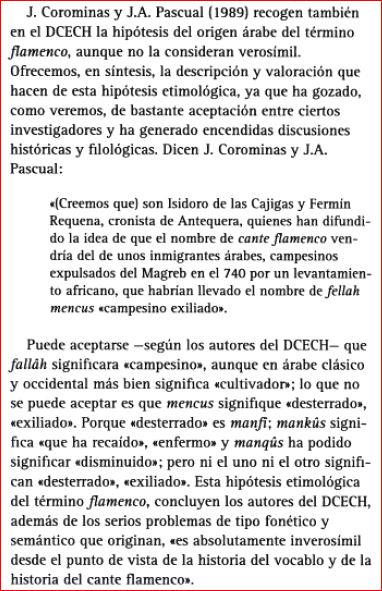
Images are resized automatically to a maximum width of 800px
 Attachment (1) Attachment (1)
_____________________________
Konstantin
|
|
|
|
REPORT THIS POST AS INAPPROPRIATE |
Date May 16 2021 20:21:49
 |
|

   
BarkellWH
Posts: 3458
Joined: Jul. 12 2009
From: Washington, DC

|
 RE: Can a white man play the blues? (in reply to BarkellWH) RE: Can a white man play the blues? (in reply to BarkellWH)
|
|
|
quote:
Then there is the Andalusian politician and musicologist Blas Infante who was executed by Franco's forces when they took over seville in 1936. Blas Infante in his book "Orígenes de lo flamenco" (Origins of flamenco) claims that the word “flamenco” was derived from the Arabic term Felah-Mengus, which means “wandering peasant”. I find that a bit far-fetched and think the etymology of the word "flamenco" points to Flanders and "Flemish," as we have discussed above.
Konstantin,
I don't want to take anything away from your usual exhaustive research, but would just point out my post on April 22, quoted above, regarding Blas infante and "Felah-Mengu."
Bill
_____________________________
And the end of the fight is a tombstone white,
With the name of the late deceased,
And the epitaph drear, "A fool lies here,
Who tried to hustle the East."
--Rudyard Kipling
|
|
|
|
REPORT THIS POST AS INAPPROPRIATE |
Date May 16 2021 21:42:37
 |
|

   
kitarist
Posts: 1715
Joined: Dec. 4 2012

|
 RE: Can a white man play the blues? (in reply to Richard Jernigan) RE: Can a white man play the blues? (in reply to Richard Jernigan)
|
|
|
quote:
Gamboa cites the earliest occurrence of the phrase "musica flamenca" yet found up to the time of writing, in the newspaper "La España" February 2, 1853. The music had existed for some time previously, called "cantes andaluces," "canciones gitanas," "bailes de palillo," etc.
The earliest mention in the press of 'flamenco' unequivocally referring to gitano music and flamenco as a genre of music seems to be six years earlier, on June 6, 1847 - found after Gamboa's book's publication, in 2008, by Faustino Nunez.
(Though I understand the difference between earliest occurrence of that exact phrase versus the same idea but expressed with slightly different words; I think the latter is more relevant anyway, for our purposes.)
It is a little article in the Madrid newspaper "El Espectador" entitled 'Un Cantante Flamenco'.
Here is a direct link from the Spanish National Library to page 3 of the newspaper, for those who enjoy these things like I do, where the article is the first under the heading 'VARIEDADES' in the right-most column:
http://hemerotecadigital.bne.es/issue.vm?id=0003788404&page=3&search=flamenco&lang=es
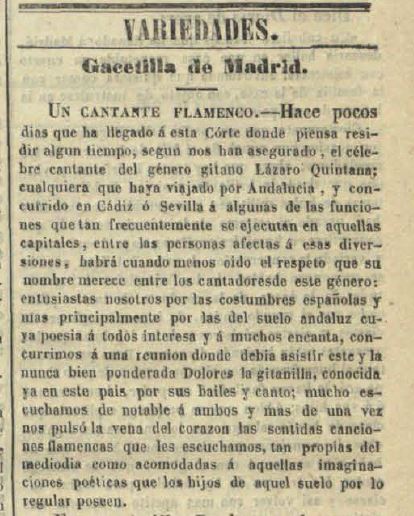
It talks about Lazaro Quintana, a famous flamenco singer born in 1802 (therefore he would have been 45 at the time); also Dolores 'la guitanilla', famous for her singing and dancing. Apologies if I messed up some words; typed it in manually, and I am not exactly fluent in Spanish.
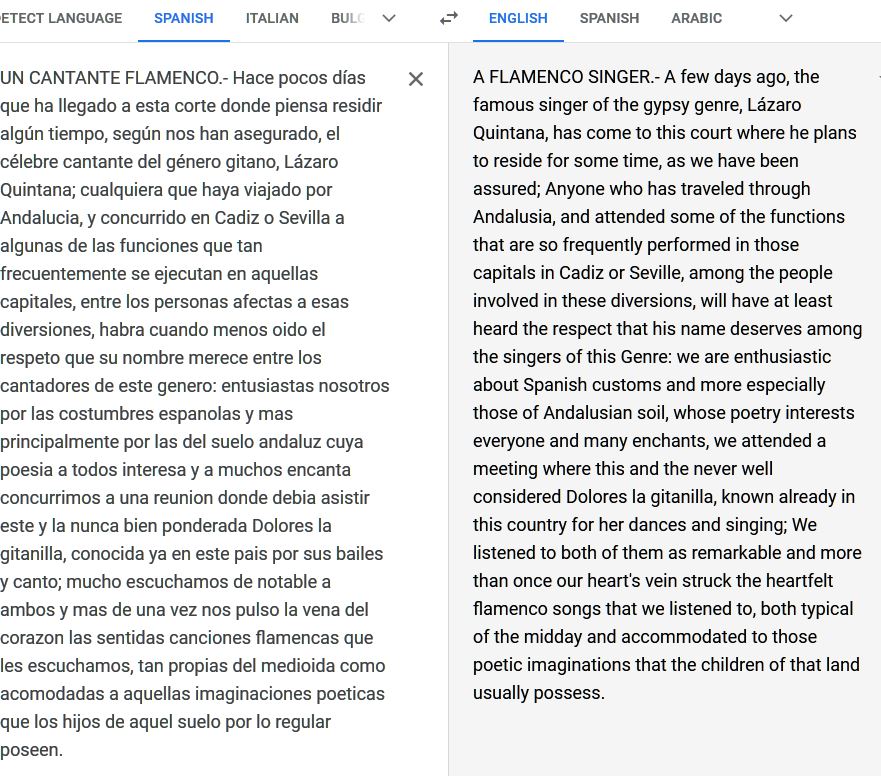
The run of this newspaper is available as txt files at the site, and I actually downloaded it all and did a word search for 'flamenc' over all its issues just for fun - as it was easy to do auto-search of all files at once with Notepad++. A few hits before 1847, but always in reference to Flemish.
Images are resized automatically to a maximum width of 800px
 Attachment (2) Attachment (2)
_____________________________
Konstantin
|
|
|
|
REPORT THIS POST AS INAPPROPRIATE |
Date May 22 2021 19:50:44
 |
|

   
kitarist
Posts: 1715
Joined: Dec. 4 2012

|
 RE: Can a white man play the blues? (in reply to Ricardo) RE: Can a white man play the blues? (in reply to Ricardo)
|
|
|
quote:
ORIGINAL: Ricardo
quote:
The earliest mention in the press of 'flamenco' unequivocally referring to gitano music and flamenco as a genre of music seems to be six years earlier, on June 6, 1847
Can we get a timeline? It is all muddled in my head right now.
Yeah, I am trying to do that for myself and will post it, but first a couple more things to clarify/report. One in particular I'd like the opinion of those fluent in Spanish as, contrary to what has been claimed by some authors, it does not seem to me like an instance of use of flamenco as anything other than referring to Flemish. (coming in its own post soon)
quote:
There was 1790’s news story of someone singing fandangos,
In this thread, or something you know about from elsewhere? BTW if you are looking for references to fandangos, there are probably a lot of them and from much earlier.
quote:
then we have books that reference a Juerga in the 1830’s? I forget the book and author.
In this thread? If it is about this thread, what Richard found - Álvarez Caballero referring to something from 1830s - I will talk about this next. This is the piece I am not sure actually refers to 'flamenco' in any non-Flemish way (but may also be from much earlier - first mentioned in 1807).
quote:
There was a patio in triana describing a flamenco performance of Solea I thought but can’t find it, 1840s I thought (or was that the Juerga I am thinking of?)
In this thread? Don't know what this is referring to. Unless is the same 1830s Alvarez reference.
quote:
Gamboa 1853 thing
The Gamboa Feb 2, 1853 thing I couldn't actually find in the primary source at first. No word matches but also the OCR that biblioteca de Espana did as a little screwy. I checked again now and it is actually from Feb 18, 1853 so I would not have found it in the Feb 2 issue anyway, OCR errors or not 
(Apart from OCR difficulties, the txt files generated are not easily readable because the generated text runs continuously across all columns of a given horizontal line of the newspaper's page before continuing with the next line - so each article is interrupted by all its horizontal neighbours' text before getting to its own next line of text    Thus auto- word searches are the only feasible option (but then OCR issues..)) Thus auto- word searches are the only feasible option (but then OCR issues..))
Here is a direct link to page 4 of the Feb 18, 1853 issue of the newspaper "La España"; see in 2nd column from right, "northeast" from the 'GACETILLA' heading:
http://hemerotecadigital.bne.es/issue.vm?id=0002686714&page=4&search=m%C3%BAsica%20flamenca&lang=es
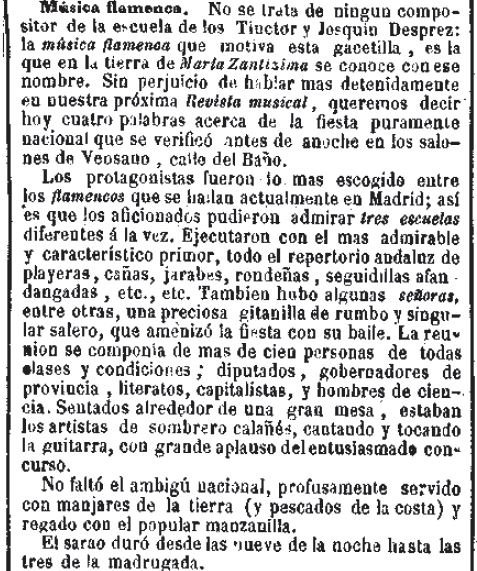
While it is not the first in the press to mention flamenco as music, it is a fairly complete description, probably the first of its kind, of a flamenco fiesta/juerga (EDIT: Forgot about Cadalso's 1792 description, though that one is more vague). It is so delightful to read that level of detailed description. I had to prefix some words with "_" to prevent Google from translating them; also figured out the composer references in the introductory sentence and modified names accordingly so more info can be searched for if one so desires.
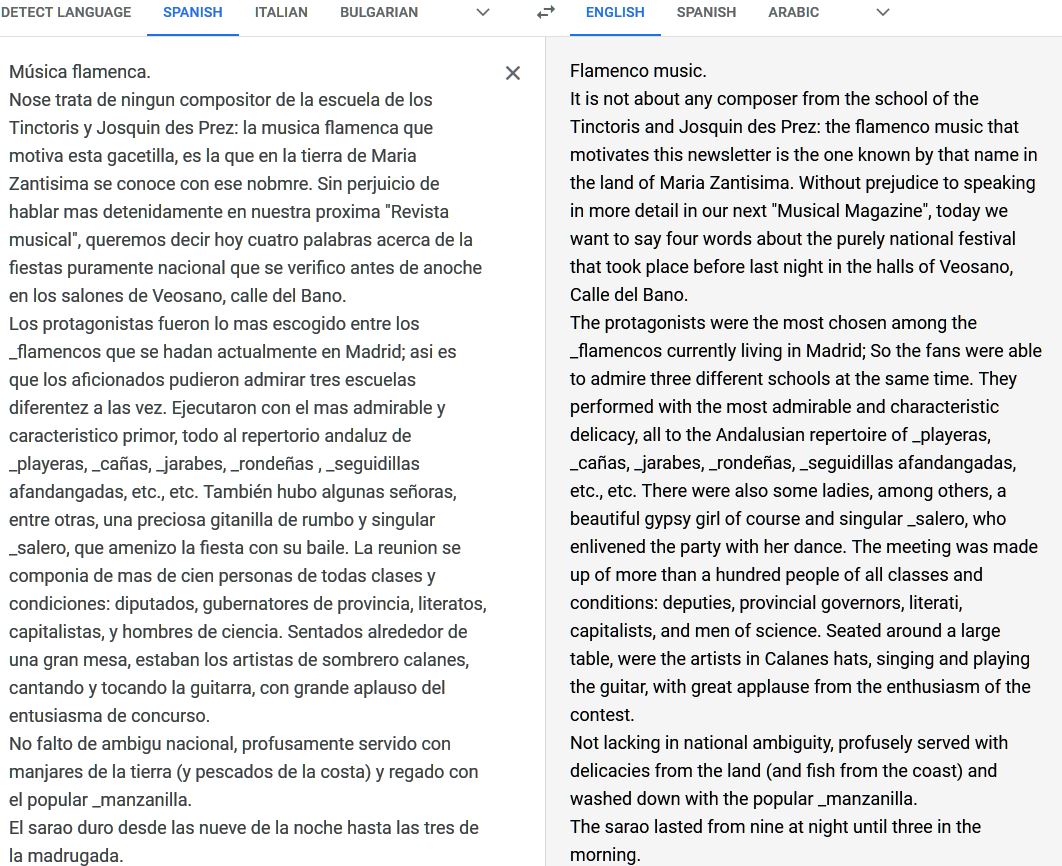
BTW "seguidillas afandangadas" were a thing (news to me at least). Here is an example from the 1900s (author born in 1880s), from https://www.musicatradicional.eu/node/18335
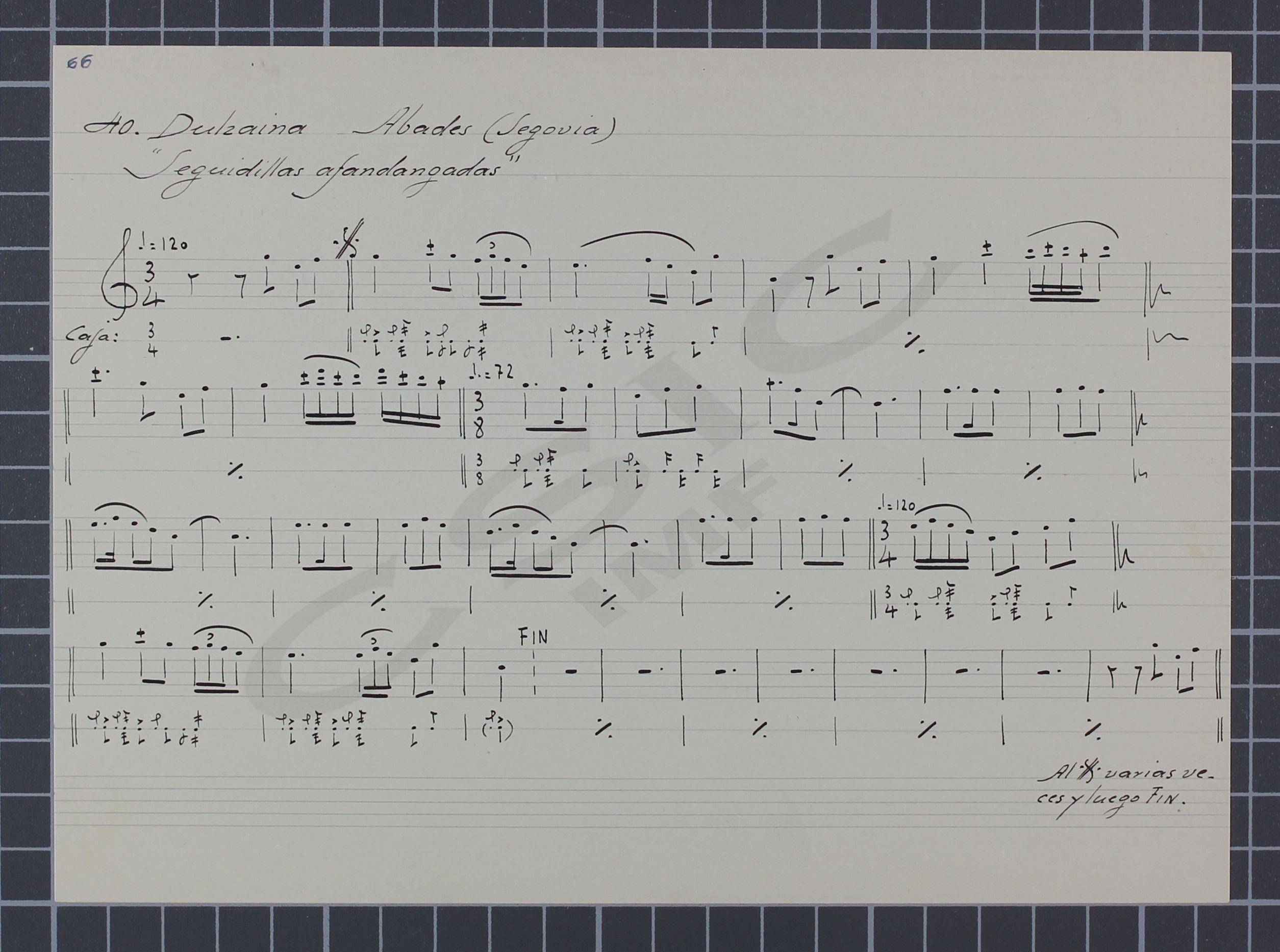
Also, sombrero calañés or sombrero de Calañas is this type of hat from Huelva:
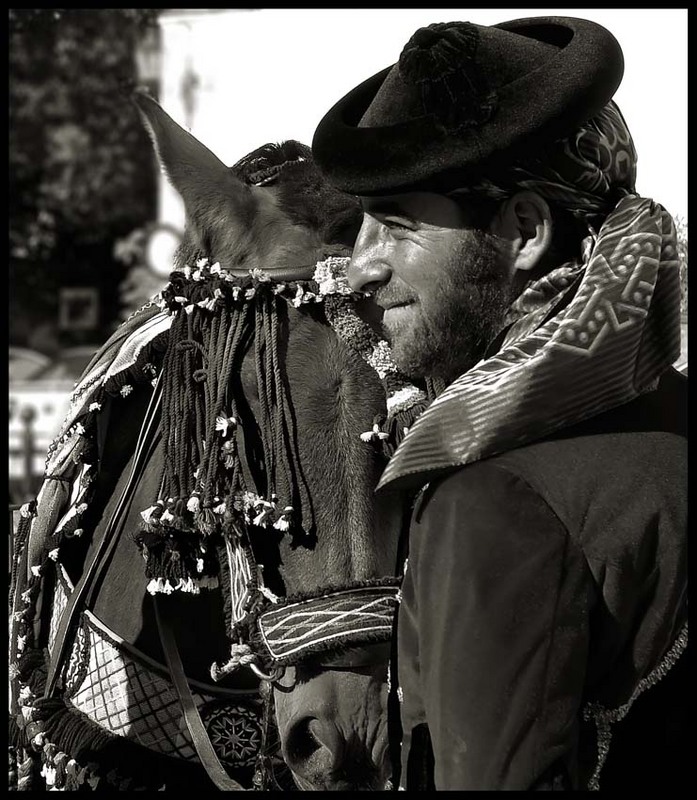
So now we can picture it all!
Images are resized automatically to a maximum width of 800px
 Attachment (4) Attachment (4)
_____________________________
Konstantin
|
|
|
|
REPORT THIS POST AS INAPPROPRIATE |
Date May 23 2021 22:09:33
 |
|

   
kitarist
Posts: 1715
Joined: Dec. 4 2012

|
 RE: Can a white man play the blues? (in reply to kitarist) RE: Can a white man play the blues? (in reply to kitarist)
|
|
|
quote:
It talks about Lazaro Quintana, a famous flamenco singer born in 1802 (therefore he would have been 45 at the time); also Dolores 'la guitanilla', famous for her singing and dancing.
Just to add that I found more information about how this singer relates to others in a 2019 Doctoral dissertation entitled "El flamenco como hecho escénico : las danzas tradicionales españolas en el origen de lo jondo", by JF Bergillos Gómez. The thesis is freely available here: http://rabida.uhu.es/dspace/handle/10272/16993
On page 154 it reads:
"..Lázaro Quintana (1802-?), hijo de Dolores, sobrino del Planeta (Antonio Alonso Monge Rivero, 1790-1856) y del bailaor bolero Luis Alonso (Cádiz, 1788-1862)..."
So "Dolores la gitanilla", also mentioned in the El Espectador notice from Jun 6, 1847, was his mother, and famous cantaor El Planeta was his uncle!
_____________________________
Konstantin
|
|
|
|
REPORT THIS POST AS INAPPROPRIATE |
Date May 24 2021 5:42:05
 |
|

   
Ricardo
Posts: 14797
Joined: Dec. 14 2004
From: Washington DC

|
 RE: Can a white man play the blues? (in reply to Estevan) RE: Can a white man play the blues? (in reply to Estevan)
|
|
|
quote:
ORIGINAL: Estevan
quote:
Can we get a timeline? It is all muddled in my head right now.
It's just your fingers that were muddled, typing the wrong century for most of your references!
I guess I don’t get the joke there. So we can start with polo and I quote Kitarist:
quote:
And the first description of a flamenco juerga/fiesta dates from 1773-74 and appears in the 1793 Cartas Marruecas book by Cadalso.
That was the Juerga. So the other stuff in my brain about Triana I read elsewhere and as I find stuff I will edit this post and add below. Polo is a flamenco cante for sure.
Here is the Triana description from the “best article about flamenco” thread where Kitarist actually linked to the better written article lol
quote:
In 1847, Calder6n wrote Escenas Andaluzas. This detailed description of twenty-two typical Andalucian scenes includes one called Un baile de Triana(A Dance in Triana), in which Calder6n described what we would call today a fiesta flamenca. In a patio in Triana (Sevilla) were gathered a number of artists, among them some legendary figures in the history of flamenco: the singers El Planeta and El Fillo (whose raspy voice became the prototype for gypsy flamenco singing and gave us the term afilla to describe that vocal quality) and the dancers La Perla and El Jerezano. Calder6n writes of the guitar, at first strumming softly then more strongly, of the singer's warm-up using passages of "Ay, ay...," and of a number of cantes. The cantes were derived from the ancient ballads of northern Spain, modified by Arabic melodies, and spread through the south by the gypsies. This tradition survives only in remote areas of Andalucia, although it has been resurrected somewhat recently).
George Borrows Zincali 1841 references flamencos and Flamenca de Roma.
From same article above flamenco clubs are known to exist from 1842 and later re established 1860:
quote:
The earliest known cafes de cante, as the first flamenco nightclub were called, opened in Sevilla in 1842. For the first time flamenco artists were paid on a regular basis. Several more clubs opened, but then all were closed down, and it was another twenty years before the great Silverio Franconetti, returned from South America and opened the first cafe cantante in Sevilla and officially began the "Golden Age." The interest in flamenco must have been building, because after Silverio opened his café in 1860, the result was a virtual explosion of similar cafes throughout Andalucia, and even in other parts of Spain (especially in Madrid and Barcelona).
_____________________________
CD's and transcriptions available here:
www.ricardomarlow.com
|
|
|
|
REPORT THIS POST AS INAPPROPRIATE |
Date May 24 2021 15:32:45
 |
|

   
kitarist
Posts: 1715
Joined: Dec. 4 2012

|
 RE: Can a white man play the blues? (in reply to Ricardo) RE: Can a white man play the blues? (in reply to Ricardo)
|
|
|
quote:
ORIGINAL: Ricardo
quote:
ORIGINAL: Estevan
quote:
Can we get a timeline? It is all muddled in my head right now.
It's just your fingers that were muddled, typing the wrong century for most of your references!
I guess I don’t get the joke there.
You typed most of the years as 1930, 1940, etc. (20th century) - I corrected that in your quotes as it was clear what you meant and no need to confuse others if reading it later in my response.
quote:
So we can start with polo and I quote Kitarist:
quote:
And the first description of a flamenco juerga/fiesta dates from 1773-74 and appears in the 1793 Cartas Marruecas book by Cadalso.
That was the Juerga.
I forgot about this; that's right. Though the description was much more vague and brief compared to the newspaper's from 1853.
quote:
Here is the Triana description from the “best article about flamenco” thread where Kitarist actually linked to the better written article lol
quote:
In 1847, Calder6n wrote Escenas Andaluzas. This detailed description of twenty-two typical Andalucian scenes includes one called Un baile de Triana(A Dance in Triana), in which Calder6n described what we would call today a fiesta flamenca. In a patio in Triana (Sevilla) were gathered a number of artists, among them some legendary figures in the history of flamenco: the singers El Planeta and El Fillo (whose raspy voice became the prototype for gypsy flamenco singing and gave us the term afilla to describe that vocal quality) and the dancers La Perla and El Jerezano. Calder6n writes of the guitar, at first strumming softly then more strongly, of the singer's warm-up using passages of "Ay, ay...," and of a number of cantes. The cantes were derived from the ancient ballads of northern Spain, modified by Arabic melodies, and spread through the south by the gypsies. This tradition survives only in remote areas of Andalucia, although it has been resurrected somewhat recently).
And I forgot about this article as it didn't provide any references. But now that I've read so much relevant stuff - revisiting it, it checks out so far in the excerpts you posted.
Any comments on "seguidillas afandangadas" since we have a complete example in standard notation?
_____________________________
Konstantin
|
|
|
|
REPORT THIS POST AS INAPPROPRIATE |
Date May 24 2021 20:53:04
 |
|

   
kitarist
Posts: 1715
Joined: Dec. 4 2012

|
 RE: Can a white man play the blues? (in reply to kitarist) RE: Can a white man play the blues? (in reply to kitarist)
|
|
|
quote:
ORIGINAL: kitarist
quote:
^ Álvarez Caballero (1981: 134) cita una tonadilla de 1830 en que se encontraría la primera atestación de 'flamenco' como sinónimo de gitano y su lenguaje.
I can't find the source for this []
Found it! However, this opened a couple of questions that I'd like help with from those of you with good command of Spanish (doesn't matter if native speaker or not):
1. What is the actual year when this scenic tonadilla was created - 1807 or 1830? (Or, are there two different piezas by the same name or is it the same piece?)
2. Is its use of 'flamenco' indeed novel, non-Flemish-related, use of the word, or not?
First, let's go over what Alvarez Caballero is referring to and when did this piece get created:
Alvarez, quoting Larrea 1974, was referring to a pieza labelled as either a scenic tonadilla "Gitanos de Cadiz osea el Tio Conejo" (in the 1830s) or as a sainete "El tío Conejo metiendo la cara en barro, o, Los gitanos de Cádiz" (in the 1840s) - we can verify that these two are the same thing because the text survives. BTW, given there is no sheet music to be found for it, it seems more likely it was a sainete – a short farce.
Other scholars, however, have claimed that the piece was created much earlier - based on a newspaper announcement from Dec 30, 1807. I discovered that the first time that notice appeared was actually five days earlier, on Christmas day 1807, so this is what I am going to show you below.
It is a notice in the newspaper "Diario mercantil de Cádiz" under the rubric "Diversiones Publicas" where normally theatrical and other arts events are announced.
And there it is on Dec 25, 1807, an announcement about a piece called "El Tio Conejo" (direct link):
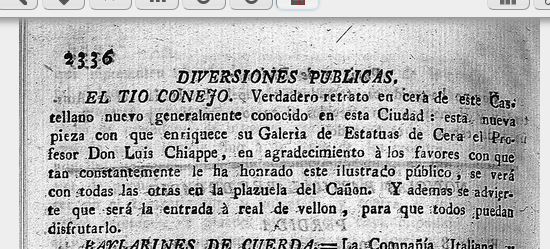
The text and its google translation are.. not very clear to me - what does this even mean and how does the text indicate anything about a sainete/pieza or its plot? Isn't this just a description of some new painting or statue (whatever is wax portrait/statue) that is to be exhibited by a certain Don Luis Chiappe (there was no such person authoring sainetes/tonadillas; I checked)? Does this text make sense as a description of a play (not to me)? Or is the google translation throwing it all off?
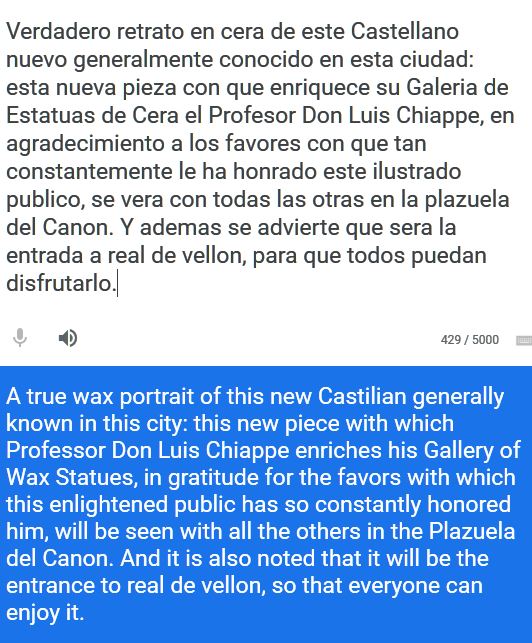
Also take another look after you see below what the 1830 piece is like and is about, but it is strange to me that some scholars think this is referring to the same piece as the 1830 finding - which makes me doubt the translation or my thinking about this.
Additionally, I found out the primary source at the Cadiz municipal library and the biblio record clearly states it is an (anonymous) manuscript from 1830; the paper record also includes the censor's notice of release dated Jan 9, 1831. This would happen for a newly-created work which seeks to be performed in public and is the second reason why I think the 1807 'El Tio Conejo' is a coincidence in name only with nothing else in common.
Second, let's go over two excerpts from "El tío Conejo metiendo la cara en barro, o, Los gitanos de Cádiz" - the second containing the magic word 'flamenco' - and look for the most probable meaning.
The entire 1844 edition is on archive.org here: https://archive.org/details/eltioconejometie00unse/mode/2up
Here's the first excerpt on page 4:
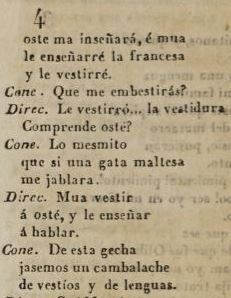
And, transcribed and translated (modified Conejo's "embestiras" as the author is making him speak broken Spanish , I think):
Conejo: Que me emvestiras?
Director: Le vestirro... la vestidura Comprende oste?
Conejo: Lo mesmito que si una gata maltesa me jablara.
Conejo: What will you dress me up?
Director: I will dress you ... the garment. Do you understand?
Conejo: As much as if a Maltese cat is talking to me.
Here's the second excerpt on page 7 that scholars are quoting:

And, transcribed and translated:
Director: Mi estar comer contronfios; viva el cachucha. Coneco, mi saber parlar guitano, ah?
Conejo: Lo mesmito que un flamenco.
Director: I will eat [...]; long live the cachucha. Conejo, I know how to speak Gitano, eh?
Conejo: As much as [a] flamenco.
Here's my problem - everyone is claiming that in the second excerpt the word 'flamenco' has been used in a non-Flemish way and is referring to the gitanos. In other words, they are reading the Conejo answer " Lo mesmito que un flamenco" as "As much/well as a flamenco [person]" - a lot hinges on the 'un'.
Whereas, I noticed the earlier Conejo answer where he is using the same phrase structure, and it is a sarcastic answer, but anyway the structure is the same: "Lo mesmito que [] una .."
Therefore I am reading Conejo's answer in the second excerpt as a sarcastic reply saying "As much as [you can speak] Flemish" - meaning not very much at all; Conejo is mocking him.
I hope you can help me figure out which answer is correct; you may need to read around the excerpts in the primary source for more context (also revisit above the 1807 El Tio Conejo notice - given the text of the sainete as shown in the 1844 printing, is there any way that notice is referring to this pieza?
This is the last piece of the flamenco-related timeline that is still not settled for me. After that I will post the timeline. You will see a few surprises there!
Thanks!
Images are resized automatically to a maximum width of 800px
 Attachment (4) Attachment (4)
_____________________________
Konstantin
|
|
|
|
REPORT THIS POST AS INAPPROPRIATE |
Date May 28 2021 23:08:20
 |
|

  
Beni2
Posts: 139
Joined: Apr. 23 2018

|
 RE: Can a white man play the blues? (in reply to kitarist) RE: Can a white man play the blues? (in reply to kitarist)
|
|
|
quote:
Second, let's go over two excerpts from "El tío Conejo metiendo la cara en barro, o, Los gitanos de Cádiz" - the second containing the magic word 'flamenco' - and look for the most probable meaning.
The entire 1844 edition is on archive.org here: https://archive.org/details/eltioconejometie00unse/mode/2up
Here's the first excerpt on page 4:
And, transcribed and translated (modified Conejo's "embestiras" as the author is making him speak broken Spanish , I think):
Conejo: Que me emvestiras?
Director: Le vestirro... la vestidura Comprende oste?
Conejo: Lo mesmito que si una gata maltesa me jablara.
Conejo: What will you dress me up?
Director: I will dress you ... the garment. Do you understand?
Conejo: As much as if a Maltese cat is talking to me.
Here's the second excerpt on page 7 that scholars are quoting:
And, transcribed and translated:
Director: Mi estar comer contronfios; viva el cachucha. Coneco, mi saber parlar guitano, ah?
Conejo: Lo mesmito que un flamenco.
Director: I will eat [...]; long live the cachucha. Conejo, I know how to speak Gitano, eh?
Conejo: As much as [a] flamenco.
Here's my problem - everyone is claiming that in the second excerpt the word 'flamenco' has been used in a non-Flemish way and is referring to the gitanos. In other words, they are reading the Conejo answer " Lo mesmito que un flamenco" as "As much/well as a flamenco [person]" - a lot hinges on the 'un'.
Whereas, I noticed the earlier Conejo answer where he is using the same phrase structure, and it is a sarcastic answer, but anyway the structure is the same: "Lo mesmito que [] una .."
Therefore I am reading Conejo's answer in the second excerpt as a sarcastic reply saying "As much as [you can speak] Flemish" - meaning not very much at all; Conejo is mocking him.
I hope you can help me figure out which answer is correct; you may need to read around the excerpts in the primary source for more context (also revisit above the 1807 El Tio Conejo notice - given the text of the sainete as shown in the 1844 printing, is there any way that notice is referring to this pieza?
This is the last piece of the flamenco-related timeline that is still not settled for me. After that I will post the timeline. You will see a few surprises there!
Thanks!
The "Tio Conejo" archetype (that Ricardo brings up) is important in my opinion. He finishes that first excerpt by stating that "From this fact we will create a swap meet of dress and language." Flamenco is not intended as a synonym for gitano here. It is a general term for the way of life (song, dance and other cultural domains) that a limited slice of the population participates in under the ubrella term "flamenco," a way of life where majos, gitanos, ruffians, bohemians, etc. mingle and contribute cultural ideas and behaviors, a true market "swap meet" or cambalache. Tio Conejo is sharing this lesson. Much of this discussion is already covered by Steingress. I would add that, because of the polysemy of "flamenco," finding its earliest incarnation could but won't necessarily be helpful.
|
|
|
|
REPORT THIS POST AS INAPPROPRIATE |
Date May 30 2021 20:14:24
 |
|
 New Messages New Messages |
 No New Messages No New Messages |
 Hot Topic w/ New Messages Hot Topic w/ New Messages |
 Hot Topic w/o New Messages Hot Topic w/o New Messages |
 Locked w/ New Messages Locked w/ New Messages |
 Locked w/o New Messages Locked w/o New Messages |
|
 Post New Thread
Post New Thread
 Reply to Message
Reply to Message
 Post New Poll
Post New Poll
 Submit Vote
Submit Vote
 Delete My Own Post
Delete My Own Post
 Delete My Own Thread
Delete My Own Thread
 Rate Posts
Rate Posts
|
|
|
Forum Software powered by ASP Playground Advanced Edition 2.0.5
Copyright © 2000 - 2003 ASPPlayground.NET |
0.09375 secs.
|


 Printable Version
Printable Version





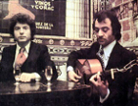
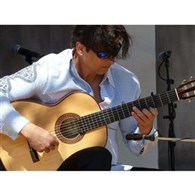


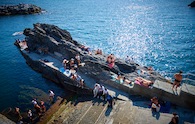
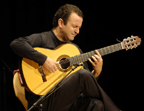


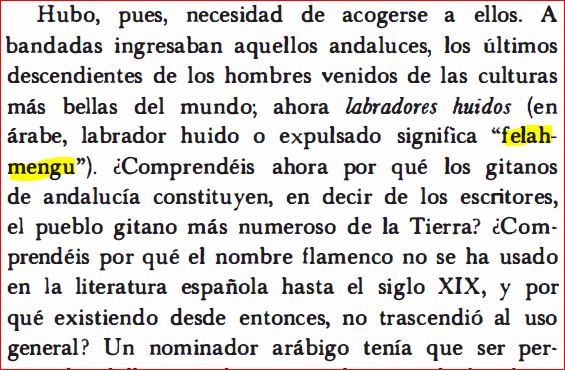









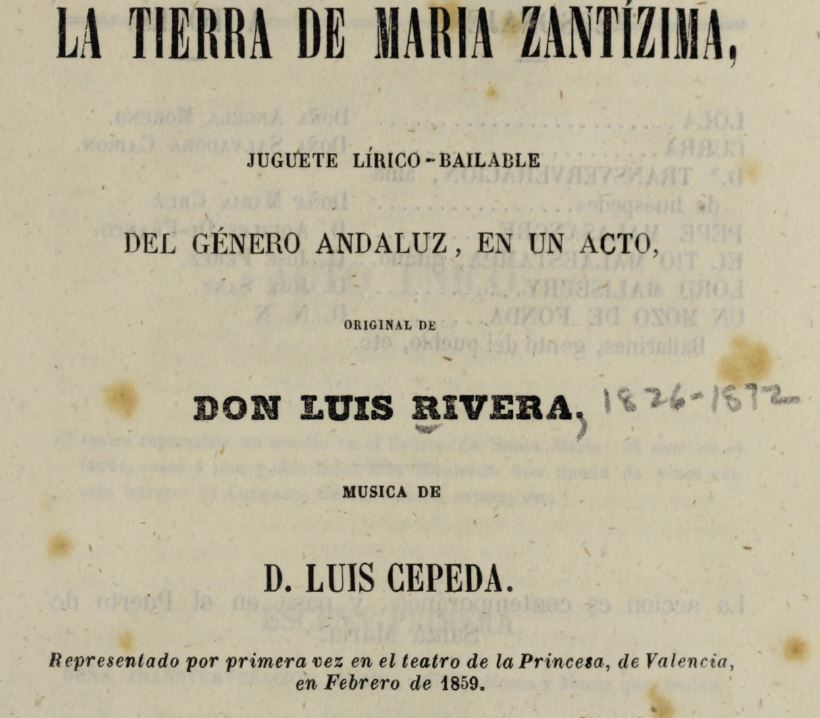




 New Messages
New Messages No New Messages
No New Messages Hot Topic w/ New Messages
Hot Topic w/ New Messages Hot Topic w/o New Messages
Hot Topic w/o New Messages Locked w/ New Messages
Locked w/ New Messages Locked w/o New Messages
Locked w/o New Messages Post New Thread
Post New Thread